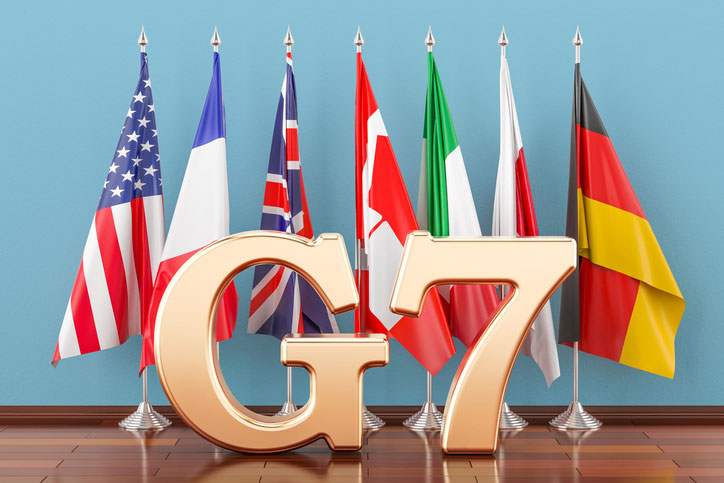Most world-renowned investments and businesses are established in the G7 countries, and rightly so. These countries are filled with many opportunities and a ready market to make businesses and investments profitable. Apart from giving one access to the world market, the ease of doing business in one of the G7 countries is also amazing.
Looking to start a business in one of the G7 countries? This article discusses the ease of doing business in these countries and why owning a business in one of them could propel you to global dominance.
Doing Business in the G7 Countries – An Introduction
The G7 comprises Germany, France, Italy, Japan, Canada, the UK, and the US. These countries are known to be the countries with the largest economies in the world. Until recently, before India and China came into the picture, they ranked among the top 7 economically developed countries.
These countries have the enabling environment, the necessary laws, and the hot market that most businesses need to thrive. In addition to that, they’re ranked by the World Bank among the easiest countries to start and run a business in the world.
Up until 2021, the World Bank publishes an annual Doing Business report that discusses the bureaucracies of most countries when it comes to business and foreign direct investments. The World Bank uses important factors like access to electricity, registering a business or property, paying taxes, getting loans, etc. to determine how easy it is to run a business in a country.
Ease of Doing Business in the G7 Countries
Though the largest economies aren’t always the easiest to start and run a business in, the G7 has consistently worked to make it easier for businesses to come and thrive in their country. These are their Doing Business scores and how they’ve been able to sustain them:
The Ease of Doing Business in Italy
Italy ranks 58 out of the 190 countries examined for ease of doing business in the world. This might look like a good rating, but it’s actually the most difficult country in the G7 to start and run a business.
This is because of its strict governmental regulations, complex tax system, and long and stressful business processes. To start a business in Italy, you have to go through a rigorous registration process with the Comunicazione Unica and the Labor Office (DPLMO).
However, Italy also presents numerous opportunities that every business owner would want to take advantage of. In addition to being among the top 25 most populous nations, the nation is also consistently ranked among the top 10 most prosperous nations. This is evident in its over 60 million population and $1.89 trillion GDP. Italy also gives you easier access to the other G7 countries and the European Union.
The Ease of Doing Business in France
At 32 out of 190 countries, France follows Italy as the second G7 country with tough business regulations and procedures.
For people who do not live in the European Union, registering a business in the nation is a difficult and stressful process. But that’s not all. In order to ensure that every employee is treated fairly, France has strict and complicated labor laws. This is evident in the high payroll taxes employers are required to pay.
Furthermore, being a French-speaking country, the cultural values and norms in France would make it hard for any American or other English-speaking businessperson to thrive. Another problem you’ll encounter is opening business accounts because it’s a necessary and time-consuming process.
The country, however, still remains one of the most viable places to do business in the world. The economy of France thrives heavily on manufacturing, technology, and tourism. Paris, the capital of France, ranks among the top four fashion hubs in the world, alongside New York, London, and Milan.
With a population of over 65 million people and a GDP of $2.9 trillion, France presents a robust market for any business to excel.
The Ease of Doing Business in Japan
Japan ranks 30 out of the 190 countries examined for ease of doing business around the world. But among the G7 countries, it is the third most difficult country to do business in.
It takes eight official procedures to register and start running a business in Japan. And these procedures can be completed in a minimum of 11 days. Furthermore, registering a property and getting electricity connected to it is a tedious task in Japan, as the latter takes approximately 105 days to complete. It also takes 14 procedures and 193 days to get a construction permit, as several government departments and local authorities are involved.
Despite all these bureaucracies, businesses are still rushing to establish themselves in Japan. Japan’s status as one of the world’s economic powerhouses lends credence to this. With a GDP of $4.9 trillion and a population of over 126 million people, Japan offers a stable economy and a huge consumer base to all businesses. Furthermore, as a leading manufacturer of automobiles, consumer electronics, textiles, computers, petrochemicals, etc., the country attracts numerous foreign investments every year.
The Ease of Doing Business in Canada
Canada ranks 23rd among the 190 countries the World Bank examined for ease of doing business. The country, unlike the previously mentioned G7 countries, offers less rigorous business registration processes and a simpler tax system. It also gives business owners easy access to other countries, with the US being its top trading partner.
Oftentimes, business owners wonder how the economy of Canada is characterized. Canada offers entrepreneurs a strong, viable economy in addition to lax business regulations and reasonable tax rates. With a $1.9 trillion GDP and a population of about 39 million people, the nation has an adequate infrastructure to support business expansion.
However, Canada has rigid processes for dealing with construction permits, connecting electricity to business properties, and registering the properties. Another challenge that many businesses may encounter is its cultural differences. That’s coupled with the fact that Canada runs a provincial system of government, which gives provinces the right to enact laws that govern them. That means a company must obey the laws and regulations governing a particular province to be allowed to do business there.
The Ease of Doing Business in Germany
With a global rank of 22 out of 190 countries, Germany ranks among the easiest countries to do business in the world. This puts it slightly above the World Bank’s preferred range of 1 to 20, and it ranks third among G7 countries in terms of ease of doing business.
Germany, being the fourth-largest economy in the world, has a GDP of 4.223 trillion. And with its population of 83 million people, half of whom are wealthy, businesses are sure to operate in an environment that fosters growth. Furthermore, Germany offers numerous incentives to encourage business owners to establish their companies in the country. This, along with its amazing investment climate, world-class infrastructure, and modern finance system, are reasons investors are flocking en masse to the country.
However, despite all the advantages it presents, Germany’s bureaucracies make it difficult for businesses to establish themselves in the country. Apart from the language and cultural barriers, business owners have to deal with the complex business registration process and tax system.
The Ease of Doing Business in the UK
The UK is undoubtedly one of the world’s top business locations. This is evident in how easy its policies, regulations, and processes are. With a global rank of 8th out of 190 countries, you can see how easy and straightforward it is to conduct business in the UK.
The cost of starting a business in the UK is low compared to other developed countries. But that’s not all. The UK presents businesses with a large consumer base of over 67 million people, most of whom have strong buying power.
Despite the numerous advantages of starting and running a business in the UK, businesses will also have to deal with the tricky tax system and cultural barriers.
The Ease of Doing Business in the US
The US is the easiest country to do business with among the G7 countries. It is one of the top business locations in the world, as evidenced by its sixth-place global ranking out of 190 countries examined.
It’s relatively easy to set up a business in the US, as the incorporation process can be completed in just three steps. The opportunities the US presents to businesses are numerous. Apart from having access to the world’s largest consumer market, business owners have the opportunity to operate in the most economically viable country in the world. Operating in the US also means you have access to the global market, as it’s easy to export to any country in the world.
The US, however, comes with its own unique challenges that affect its ease of doing business scores. The process of registering a business varies state by state in the US, making it difficult for businesses in some states and easier in others. The tax system is also complex, as there are federal, state, and local taxes that businesses need to keep up with.
Conclusion on the Ease of Doing Business in the G7 Countries
Starting or expanding your business in one of the G7 countries presents you with the opportunity to dominate the global market with ease. However, the process of doing so varies, as it can be complex in some countries and easy in others. Italy, for example, ranks 58th out of 190 countries studied for ease of doing business, while the United States ranks sixth.
Hopefully, this article has provided you with information on which G7 country to begin your expansion process with.







